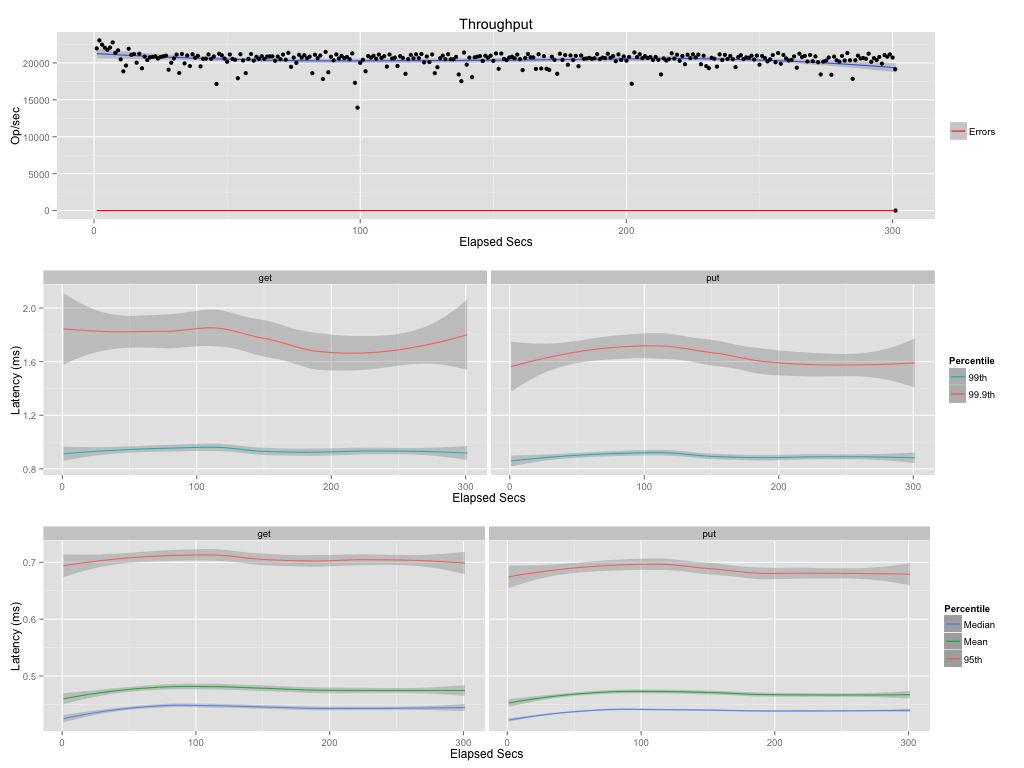Cache uses N disposable ETS tables instead of single one. The cache applies eviction and quota policies at segment level. The oldest ETS table is destroyed and new one is created when quota or TTL criteria are exceeded.
The write operation always uses youngest segment. The read operation lookup key from youngest to oldest table until it is found same time key is moved to youngest segment to prolong TTL. If none of ETS table contains key then cache-miss occurs.
The downside is inability to assign precise TTL per single cache entry. TTL is always approximated to nearest segment. (e.g. cache with 60 sec TTL and 10 segments has 6 sec accuracy on TTL)
- 2.0.0 - various changes on asynchronous api, not compatible with version 1.x
- 1.0.1 - production release
application:start(cache).
{ok, _} = cache:start_link(my_cache, [{n, 10}, {ttl, 60}]).
%% synchronous i/o
ok = cache:put(my_cache, <<"my key">>, <<"my value">>).
Val = cache:get(my_cache, <<"my key">>).
%% asynchronous i/o
Ref = cache:get_(my_cache, <<"my key">>).
receive {Ref, Val} -> Val end.The cache instances are configurable via sys.config. Theses cache instances are supervised by application
supervisor.
{cache, [
{my_cache, [{n, 10}, {ttl, 60}]}
]}The cache application uses standard Erlang distribution model. Please node that Erlang distribution uses single tcp/ip connection for message passing between nodes. Therefore, frequent read/write of large entries might impact on overall Erlang performance.
The global cache instance is visible to all Erlang nodes in the cluster.
%% at a@example.com
{ok, _} = cache:start_link({global, my_cache}, [{n, 10}, {ttl, 60}]).
Val = cache:get({global, my_cache}, <<"my key">>).
%% at b@example.com
ok = cache:put({global, my_cache}, <<"my key">>, <<"my value">>).
Val = cache:get({global, my_cache}, <<"my key">>).The local cache instance is accessible for any Erlang nodes in the cluster.
%% a@example.com
{ok, _} = cache:start_link(my_cache, [{n, 10}, {ttl, 60}]).
Val = cache:get(my_cache, <<"my key">>).
%% b@example.com
ok = cache:put({my_cache, 'a@example.com'}, <<"my key">>, <<"my value">>).
Val = cache:get({my_cache, 'a@example.com'}, <<"my key">>).MacBook Pro, Intel Core i5, 2.5GHz, 8GB 1600 MHz DDR3, 256 SSD
LRU Cache, 10 segments, 20 sec ttl (~2 sec per segment)
Local cache (application and cache within same VM)

Distributed cache (application and cache runs in different VMs)

- Jose Luis Navarro https://github.com/artefactop
- Valentin Micic